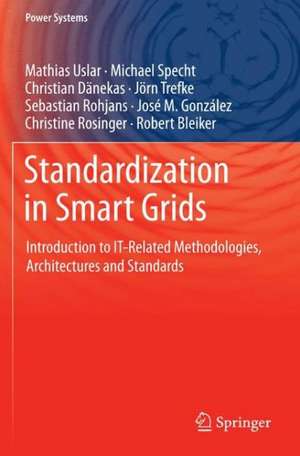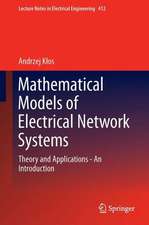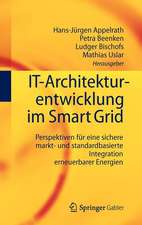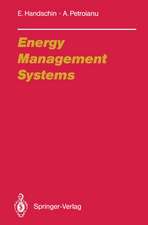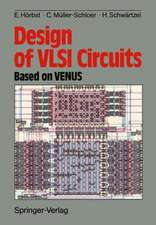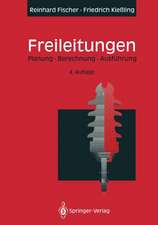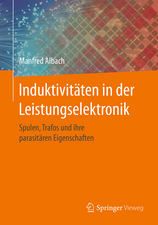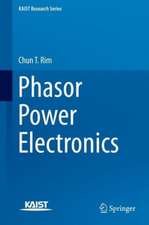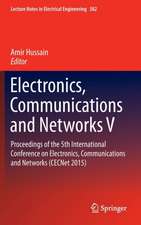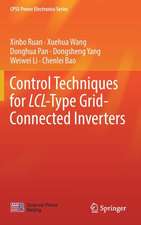Standardization in Smart Grids: Introduction to IT-Related Methodologies, Architectures and Standards: Power Systems
Autor Mathias Uslar, Michael Specht, Christian Dänekas, Jörn Trefke, Sebastian Rohjans, José M. González, Christine Rosinger, Robert Bleikeren Limba Engleză Hardback – 2 ian 2013
This domain is not only part of one Standard developing Organization (SDO), but also of many different organizations like ITU, ISO, IEC and additionally for the electro mobility part the SAE. This results in many standards which are based on different aspects. Furthermore the European mirror organizations (ETSI,CEN, CENELEC) as well as the German mirror groups of these groups are involved, which are delivering further rules and adaption for the local market. Because of this diversity of organizations involved, it is difficult for the local companies (which includes energy utility, manufacturer and software producer specialized on integration) to identify the relevant trends, standardization groups and technologies necessary.
With the EU Mandate M490 to CEN/CNELEC and TESI and the Commission being a driving force (e.g. ftp://ftp.cencenelec.eu/CENELEC/Smartgrid/SmartGridFinalReport.pdf and http://www.cenelec.eu/aboutcenelec/whatwedo/technologysectors/smartgrids.html) standardization becomes more and more important – but it’s complex and not easy to be understood. Here at OFFIS, we provide training but we are always asked for textbooks on our tranings. Based on our modules for the SG tranings, we would estimate the following chapters to be relevant to SG stakeholders in standardization (roughly 16-20 pages per chapter).
| Toate formatele și edițiile | Preț | Express |
|---|---|---|
| Paperback (1) | 639.73 lei 6-8 săpt. | |
| Springer Berlin, Heidelberg – 29 ian 2015 | 639.73 lei 6-8 săpt. | |
| Hardback (1) | 644.18 lei 6-8 săpt. | |
| Springer Berlin, Heidelberg – 2 ian 2013 | 644.18 lei 6-8 săpt. |
Din seria Power Systems
- 18%
 Preț: 953.13 lei
Preț: 953.13 lei - 18%
 Preț: 783.98 lei
Preț: 783.98 lei - 20%
 Preț: 1002.48 lei
Preț: 1002.48 lei - 18%
 Preț: 1021.86 lei
Preț: 1021.86 lei - 18%
 Preț: 897.65 lei
Preț: 897.65 lei - 18%
 Preț: 788.72 lei
Preț: 788.72 lei - 18%
 Preț: 734.27 lei
Preț: 734.27 lei - 18%
 Preț: 902.36 lei
Preț: 902.36 lei -
 Preț: 563.51 lei
Preț: 563.51 lei - 18%
 Preț: 955.08 lei
Preț: 955.08 lei - 18%
 Preț: 946.87 lei
Preț: 946.87 lei - 18%
 Preț: 950.52 lei
Preț: 950.52 lei - 18%
 Preț: 949.23 lei
Preț: 949.23 lei - 15%
 Preț: 641.85 lei
Preț: 641.85 lei - 18%
 Preț: 1116.26 lei
Preț: 1116.26 lei - 18%
 Preț: 961.10 lei
Preț: 961.10 lei - 18%
 Preț: 1380.78 lei
Preț: 1380.78 lei - 15%
 Preț: 639.59 lei
Preț: 639.59 lei - 15%
 Preț: 641.03 lei
Preț: 641.03 lei - 18%
 Preț: 2497.51 lei
Preț: 2497.51 lei - 18%
 Preț: 957.62 lei
Preț: 957.62 lei - 18%
 Preț: 1229.91 lei
Preț: 1229.91 lei - 15%
 Preț: 643.34 lei
Preț: 643.34 lei - 18%
 Preț: 957.09 lei
Preț: 957.09 lei - 18%
 Preț: 1231.47 lei
Preț: 1231.47 lei - 15%
 Preț: 698.30 lei
Preț: 698.30 lei - 18%
 Preț: 953.20 lei
Preț: 953.20 lei - 15%
 Preț: 640.88 lei
Preț: 640.88 lei - 15%
 Preț: 634.18 lei
Preț: 634.18 lei - 18%
 Preț: 955.08 lei
Preț: 955.08 lei - 18%
 Preț: 1241.73 lei
Preț: 1241.73 lei - 18%
 Preț: 952.09 lei
Preț: 952.09 lei - 18%
 Preț: 946.55 lei
Preț: 946.55 lei - 18%
 Preț: 961.86 lei
Preț: 961.86 lei - 18%
 Preț: 944.19 lei
Preț: 944.19 lei - 18%
 Preț: 1110.72 lei
Preț: 1110.72 lei - 15%
 Preț: 642.03 lei
Preț: 642.03 lei - 15%
 Preț: 636.12 lei
Preț: 636.12 lei - 18%
 Preț: 1054.99 lei
Preț: 1054.99 lei - 15%
 Preț: 639.90 lei
Preț: 639.90 lei - 18%
 Preț: 957.32 lei
Preț: 957.32 lei - 18%
 Preț: 1235.57 lei
Preț: 1235.57 lei - 18%
 Preț: 959.19 lei
Preț: 959.19 lei
Preț: 644.18 lei
Preț vechi: 757.85 lei
-15% Nou
Puncte Express: 966
Preț estimativ în valută:
123.28€ • 128.23$ • 101.77£
123.28€ • 128.23$ • 101.77£
Carte tipărită la comandă
Livrare economică 12-26 aprilie
Preluare comenzi: 021 569.72.76
Specificații
ISBN-13: 9783642349157
ISBN-10: 3642349153
Pagini: 280
Ilustrații: XXX, 250 p.
Dimensiuni: 155 x 235 x 21 mm
Greutate: 0.52 kg
Ediția:2013
Editura: Springer Berlin, Heidelberg
Colecția Springer
Seria Power Systems
Locul publicării:Berlin, Heidelberg, Germany
ISBN-10: 3642349153
Pagini: 280
Ilustrații: XXX, 250 p.
Dimensiuni: 155 x 235 x 21 mm
Greutate: 0.52 kg
Ediția:2013
Editura: Springer Berlin, Heidelberg
Colecția Springer
Seria Power Systems
Locul publicării:Berlin, Heidelberg, Germany
Public țintă
ResearchCuprins
Part I Basics and Introduction.- Part II Requirements and Architectures.- Part III Standards and Applications.- Part IV Future Applications and Outlook.
Notă biografică
Mathias Uslar has studied computer science with a minor in legal informatics at the University Of Oldenburg, Germany form 1999 till 2004. In October 2004, he started working a scientific assistant at OFFIS - Institute for Information Systems in Oldenburg, later on working there as project leader and now as Group manager in the Energy branch of the institute, leading the largest group in OFFIS. Since 2008, he is head of the CISE, the Centre for IT Standards in the Energy Sector. In October 2009, he successfully defended his phd thesis on the Integration of heterogeneous standards in the electric utility domain and smart grids. Mr Uslar is leading OFFIS' national and international work packages with the scope of standardisation and interoperability. He is member of German GI, IEEE, ACM and IEC german mirror committee member DKE K 952, 952.0.10, 952.0.17 and international member of IE TC 57 WG 14 and 16. His research interests are with Semantic modeling and technical interoperability in smart grid architectures. Currently, he is working on modeling DER like CHP oder PHEV using the CIM (IEC 61968) and creating control structures for virtual power plants.
Sebastian Rohjans has joined the OFFIS -Institute for Information Systems in late 2008. He holds a computer science degree from the University of Oldenburg with a minor in business and wrote his thesis about ontology based integration. He is now working in industrial setting projects having the same scope. His research interests include semantic web services, the OPC unified architecture and ontology based mediation.
Michael Specht works since August 2008 as a scientific assistant at the OFFIS institute. He wrote his diploma thesis about ”Ontology based integration of quality codes in the electricity domain”. His main working topics are CIM based XML messaging and CIM topology modeling.
Jose Manuel Gonzalez Vazquez works since January 2008 as a scientific assistant and PhD candidate at the OFFIS institute, Oldenburg. His research is on reference models and IT systems in the utility domain (electricity and gas). Further on he is actively involved in national and international standardization and is member of the IEC TC 57 Working Group 14, where he is part of the Common Information Model (CIM) modeling team.
Robert Bleiker works since July 2009 as a scientific assistant at the OFFIS institute. He wrote his diploma thesis about ”The word problem for petri nets”. His main working topics are automated testing of standard conformance and compliance for IEC 61850 and CIM.
Sebastian Rohjans has joined the OFFIS -Institute for Information Systems in late 2008. He holds a computer science degree from the University of Oldenburg with a minor in business and wrote his thesis about ontology based integration. He is now working in industrial setting projects having the same scope. His research interests include semantic web services, the OPC unified architecture and ontology based mediation.
Michael Specht works since August 2008 as a scientific assistant at the OFFIS institute. He wrote his diploma thesis about ”Ontology based integration of quality codes in the electricity domain”. His main working topics are CIM based XML messaging and CIM topology modeling.
Jose Manuel Gonzalez Vazquez works since January 2008 as a scientific assistant and PhD candidate at the OFFIS institute, Oldenburg. His research is on reference models and IT systems in the utility domain (electricity and gas). Further on he is actively involved in national and international standardization and is member of the IEC TC 57 Working Group 14, where he is part of the Common Information Model (CIM) modeling team.
Robert Bleiker works since July 2009 as a scientific assistant at the OFFIS institute. He wrote his diploma thesis about ”The word problem for petri nets”. His main working topics are automated testing of standard conformance and compliance for IEC 61850 and CIM.
Textul de pe ultima copertă
Besides the regulatory and market aspects, the technical level dealing with the knowledge from multiple disciplines and the aspects of technical system integration to achieve interoperability and integration has been a strong focus in the Smart Grid. This topic is typically covered by the means of using (technical) standards for processes, data models, functions and communication links. Standardization is a key issue for Smart Grids due to the involvement of many different sectors along the value chain from the generation to the appliances. The scope of Smart Grid is broad, therefore, the standards landscape is unfortunately very large and complex. This is why the three European Standards Organizations ETSI, CEN and CENELEC created a so called Joint Working Group (JWG). This was the first harmonized effort in Europe to bring together the needed disciplines and experts delivering the final report in May 2011. After this approach proved useful, the Commission used the Mandate M/490: Standardization Mandate to European Standardization Organizations (ESOs) to support European Smart Grid deployment. The focal point addressing the ESO’s response to M/490 will be the CEN, CENELEC and ETSI Smart Grids Coordination Group (SG-CG). Based on this mandate, meaningful standardization of architectures, use cases, communication technologies, data models and security standards takes place in the four existing working groups.
This book provides an overview on the various building blocks and standards identified as the most prominent ones by the JWG report as well as by the first set of standards group - IEC 61850 and CIM, IEC PAS 62559 for documenting Smart Grid use cases, security requirements from the SGIS groups and an introduction on how to apply the Smart Grid Architecture Model SGAM for utilities. In addition, future standards from ENTSO-E for market communications, standards for electric vehicles and future industrial automation, OPC UA are introduced.
This book provides an overview on the various building blocks and standards identified as the most prominent ones by the JWG report as well as by the first set of standards group - IEC 61850 and CIM, IEC PAS 62559 for documenting Smart Grid use cases, security requirements from the SGIS groups and an introduction on how to apply the Smart Grid Architecture Model SGAM for utilities. In addition, future standards from ENTSO-E for market communications, standards for electric vehicles and future industrial automation, OPC UA are introduced.
Caracteristici
Introduction to Standardization for Smart Grids Presents a tutorial and best practice of Smart Grid Prototype Projects Written by leading experts in the field
